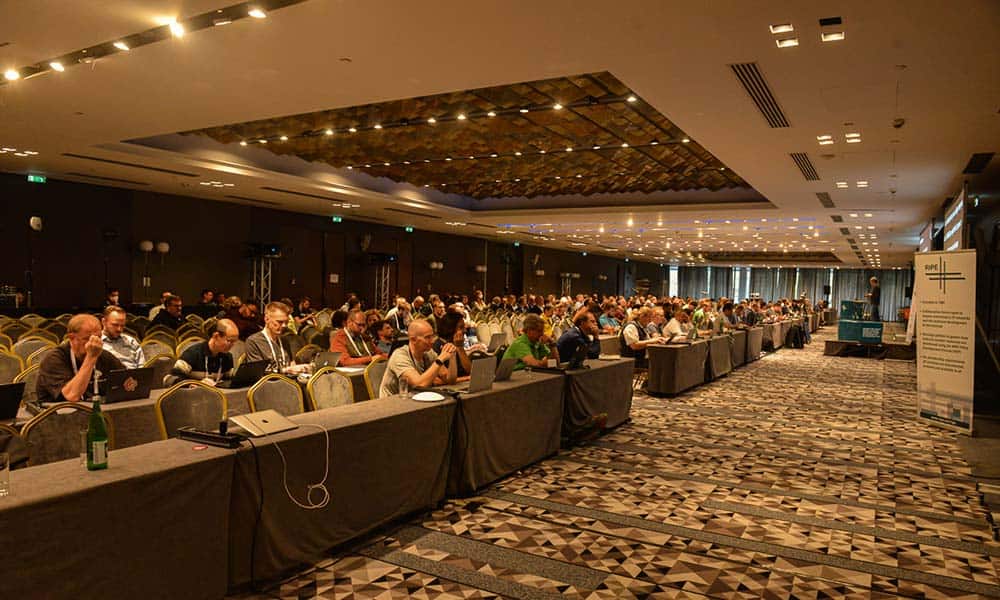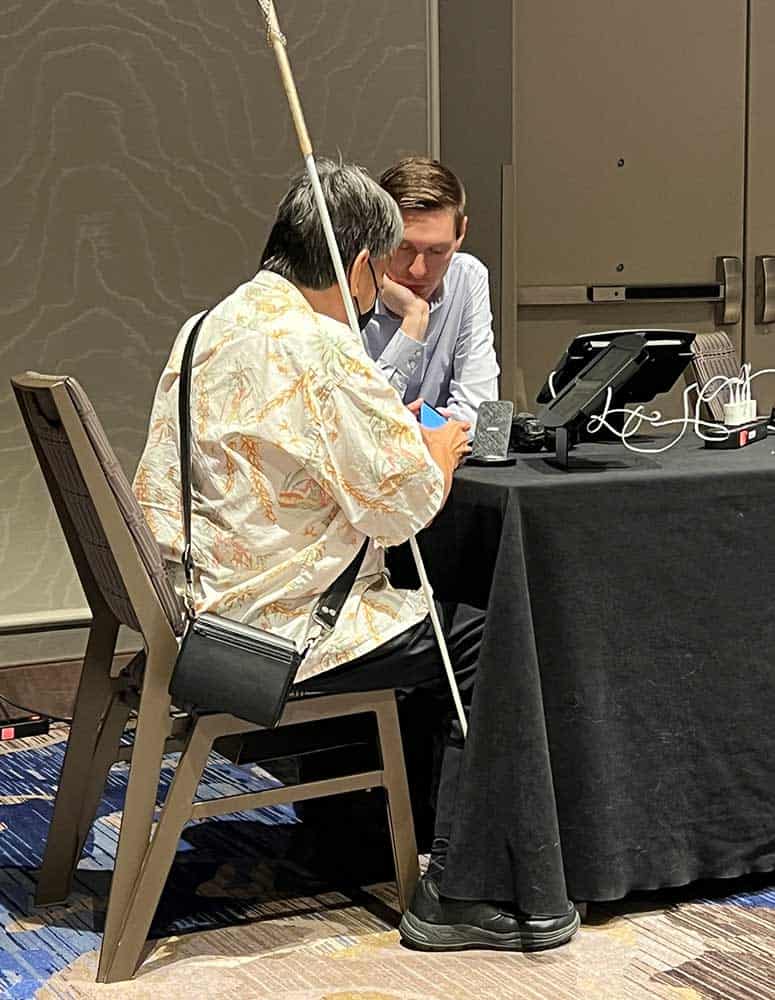Electa
One Complete System for Scheduled and Live Conference Voting
The next-generation secure and end-to-end verifiable online voting system
Whether in the form of national elections, collective agreements, shareholder meetings, general assemblies, or anything else, all democratic elections are important. They deserve nothing less than a market leading, end-to-end verifiable online voting system.
Electa is built on mathematically-proven, academically-reviewed cryptography and algorithms, as well as engineered to preserve the integrity of your elections, as the culmination of decades of experience. All without sacrificing either flexibility or user-friendliness.
Electa
One Complete System for Scheduled and Live Conference Voting
The next-generation secure and end-to-end verifiable online voting system
Whether in the form of national elections, collective agreements, shareholder meetings, general assemblies, or anything else, all democratic elections are important. They deserve nothing less than a market leading, end-to-end verifiable online voting system.
Electa is built on mathematically-proven, academically-reviewed cryptography and algorithms, as well as engineered to preserve the integrity of your elections, as the culmination of decades of experience. All without sacrificing either flexibility or user-friendliness.
Flexible
Electa is the culmination of our collective experience of conducting more than 7,000 online election events over 20+ years, supporting numerous statutory and non-statutory requirements.
Proven
All democratic elections are important, and
Electa is built to comply with all fundamental democratic principles to prove the result of the election process from one end to the other.
Accessible
Our greatest achievement with Electa is making it easily accessible for voters, administrators, and scrutineers alike while still employing advanced cryptographic algorithms.
Flexible
Electa is the culmination of our collective experience of conducting more than 7,000 online election events over 20+ years, supporting numerous statutory and non-statutory requirements.
Proven
All democratic elections are important, and
Electa is built to comply with all fundamental democratic principles to prove the result of the election process from one end to the other.
Accessible
Our greatest achievement with Electa is making it easily accessible for voters, administrators, and scrutineers alike while still employing advanced cryptographic algorithms.
One Proven System to Conduct All Types of Elections and Votes
Elections and votes occur within a variety of rulesets, timeframes, and locales. To make Electa as adaptable as possible to these different circumstances, it offers two main setups for voting events, which we term Scheduled Voting and Live Conference Voting.
You may use them separately, or you may combine them in a “hybrid” solution in which eligible voters may both asynchronously cast ballots and vote synchronously on agenda items in real time at a conference.
While both options are fully documented, secure, and end-to-end verifiable with numerous features to ensure maximum usability for voters and managers alike, they each have different setup options which may work better for certain types of voting events.


Designed for votes occurring over a longer period of time
Ballots may be set up to open and close at predetermined points
Optimal for events with larger numbers of voters who cast ballots asynchronously
Often used in candidate elections, statutory elections, etc.
Well-suited for “live” events taking place within a shorter timeframe
Meeting conductor can open and close ballots at will
Results of votes can be made public instantaneously for participants
Often used in annual general meetings and conferences


Designed for votes occurring over a longer period of time
Ballots may be setup up to open and close at predetermined points
Optimal for events with larger numbers of voters who cast ballots asynchronously
Often used in candidate elections, statutory elections, etc.
Well-suited for “live” events taking place within a shorter timeframe
Meeting conductor can open and close ballots at will
Results of votes can be made public instantaneously for participants
Often used in annual general meetings and conferences
Not sure into which category your event fits?
Talk to one of our election experts and let us advise you.
Not sure into which category your event fits?
Scheduled Voting
features
Live Conference Voting
features
- Multiple voting, ranked voting and split voting
- Theme customization
- Quorum rules
- Voting weight and voting groups
- Anonymous and non-anonymous voting
- Email and SMS campaign module
- Live streaming options
- Participation registration module
- Embedded streaming optional
- Meeting communication modules
- Handraise

Designed for votes occurring over a longer period of time
Ballots may be setup up to open and close at predetermined points
Optimal for events with larger numbers of voters who cast ballots asynchronously
Often used in candidate elections, statutory elections, etc.
Scheduled Voting
features

Well-suited for “live” events taking place in a shorter timeframe
Meeting conductor can open and close ballots at will
Results of votes can be made public instantaneously for participants
Often used in annual general meetings and conferences
Live Conference Voting
features
- Multiple voting, ranked voting and split voting
- Theme customization
- Quorum rules
- Voting weight and voting groups
- Anonymous and non-anonymous voting
- Email and SMS campaign module
- Live streaming options
- Participation registration module
- Embedded streaming optional
- Meeting communication modules
- Handraise
Not sure into which category your event fits?
Common Electa features
Devices which may be used for voting
- PCs & other computers
- Tablets
- Smartphones
- Paper ballots (as part of hybrid elections, if desired)
Ways for voters to access ballots
- Digital signatures (third party authentication credentials)
- A combination of voting codes and user IDs
- Electronic identification (eID)
- Invitation by email or SMS from the built-in campaign module
“We couldn’t be more pleased with our collaboration with Assembly Voting on the votes that we held for our members and community in October 2022. We needed to find a reliable provider for our electronic voting needs in a short space of time, and Assembly Voting were able to meet all our needs and provide an excellent level of support while doing so. We’re very much looking forward to continuing with Assembly Voting as our electronic voting provider for years to come.”
Fergal Cunningham
Head of membership engagement, RIPE NCC
“The combination of system security, the user-friendly interfaces, and the operational service from Assembly Voting made us feel confident and safe throughout the process. We are very pleased with the solutions and cooperation with the Assembly Voting team.”
Gustavo Pallares
Deputy secretary general, OSCE Parliamentary Assembly


“We couldn’t be more pleased with our collaboration with Assembly Voting on the votes that we held for our members and community in October 2022. We needed to find a reliable provider for our electronic voting needs in a short space of time, and Assembly Voting were able to meet all our needs and provide an excellent level of support while doing so. We’re very much looking forward to continuing with Assembly Voting as our electronic voting provider for years to come.”
Fergal Cunningham
Head of membership engagement, RIPE NCC


“The combination of system security, the user-friendly interfaces, and the operational service from Assembly Voting made us feel confident and safe throughout the process. We are very pleased with the solutions and cooperation with the Assembly Voting team.”
Gustavo Pallares
Deputy secretary general, OSCE Parliamentary Assembly
Customers
We have served governments, municipalities, international organizations, trade unions, NGOs, private companies, and more.









End-to-end Verifiability
Many online election systems in use today suffer from technological and/or procedural gaps in their programming which open the door to speculation and doubts about the integrity of elections carried out using them. End-to-end verifiability closes these gaps by demonstrating that any election results are undoubtedly accurate.
Electa
(End-to-end verifiable)
Ensures eligibility
Verifying voter eligibility is crucial for maintaining the trustworthiness of digital elections. It prevents unauthorized voting and ensures each voter can cast only one ballot.
Anonymity proven by design
In digital voting, cryptographic techniques and mixing algorithms are used to ensure voter anonymity, making it impossible to link votes to individual voters.
Distributed trust
The system disperses responsibilities related to the conduction of elections amongst multiple parties, enhancing an election’s integrity.
Vote secrecy proven by design
Cryptographic techniques and threshold encryption safeguard both the integrity and secrecy of votes for a fair election.
Public ballot box
In digital voting, the “Public Ballot Box” acts as an open record for all election activities, allowing for thorough verification while keeping voter identities confidential.
Full auditability
The “Independent Audit” feature in Electa enables public, third-party verification, boosting any election’s transparency and security.
Integrity of election results proven by design
End-to-end verifiable digital voting ensures the integrity of results through cryptographic techniques and measures to guarantee transparency, making the election both tamper-proof and auditable.
Black-box systems
(Not end-to-end verifiable)
Ensures eligibility
In black-box systems, it is possible to conduct robust identity checks to make sure that only eligible voters may cast ballots.
Anonymity cannot be proven
In black-box systems, the inability to verify voter anonymity can discourage participation and make fraud detection harder, eroding trust and compromising an election’s integrity.
No distributed trust
A lack of distributed trust in blackbox voting centralizes control and threatens an election’s integrity, damaging public confidence.
Vote secrecy cannot be proven
Lack of verifiable vote secrecy in black-box systems can deter voters from casting ballots and leave them susceptible to coercion, undermining both an election’s integrity and public trust.
No public ballot box
The absence of a public ballot box in black-box systems renders them opaque and unable to be audited, affecting public trust while making recounts challenging.
Limited auditability
Limited auditability in black-box systems hampers transparency, makes error tracing difficult, and leaves the system vulnerable to fraud, sacrificing an election’s integrity.
Integrity of election results cannot be proven
When utilizing black-box systems, the inability to verify the integrity of results can raise doubts, enable manipulation, and complicate issue resolution, making measures like end-to-end verifiability crucial.
Electa
(End-to-end verifiable)
Ensures eligibility
Verifying voter eligibility is crucial for maintaining the trustworthiness of digital elections. It prevents unauthorized voting and ensures each voter can cast only one ballot.
Anonymity proven by design
In digital voting, cryptographic techniques and mixing algorithms are used to ensure voter anonymity, making it impossible to link votes to individual voters.
Distributed trust
The system disperses responsibilities related to the conduction of elections amongst multiple parties, enhancing an election’s integrity.
Vote secrecy proven by design
Cryptographic techniques and threshold encryption safeguard both the integrity and secrecy of votes for a fair election.
Public ballot box
In digital voting, the “Public Ballot Box” acts as an open record for all election activities, allowing for thorough verification while keeping voter identities confidential.
Full auditability
The “Independent Audit” feature in Electa enables public, third-party verification, boosting any election’s transparency and security.
Integrity of election results proven by design
End-to-end verifiable digital voting ensures the integrity of results through cryptographic techniques and measures to guarantee transparency, making the election both tamper-proof and auditable.
Black-box systems
(Not end-to-end verifiable)
Ensures eligibility
In black-box systems, it is possible to conduct robust identity checks to make sure that only eligible voters may cast ballots.
Anonymity cannot be proven
In black-box systems, the inability to verify voter anonymity can discourage participation and make fraud detection harder, eroding trust and compromising an election’s integrity.
No distributed trust
A lack of distributed trust in blackbox voting centralizes control and threatens an election’s integrity, damaging public confidence.
Vote secrecy cannot be proven
Lack of verifiable vote secrecy in black-box systems can deter voters from casting ballots and leave them susceptible to coercion, undermining both an election’s integrity and public trust.
No public ballot box
The absence of a public ballot box in black-box systems renders them opaque and unable to be audited, affecting public trust while making recounts challenging.
Limited auditability
Limited auditability in black-box systems hampers transparency, makes error tracing difficult, and leaves the system vulnerable to fraud, sacrificing an election’s integrity.
Integrity of election results cannot be proven
When utilizing black-box systems, the inability to verify the integrity of results can raise doubts, enable manipulation, and complicate issue resolution, making measures like end-to-end verifiability crucial.
Technology Leadership in Elections
Electa is based on mathematically-proven algorithms and technologies which are available for audit via open-source software. This demonstrates that Electa is a fully-documented system which is freely and openly accessible for researchers and independent auditors to scrutinize.
Electa upholds the integrity of any voting event through multiple individual and universal verification options for eligible voters, election officials, independent auditors, and observers.
Electa is built to ensure anonymity and voting secrecy by design. End-to-end encryption utilized in the electoral process and mixing processes, which separate voters from their votes prior to the calculation of results, means that voters have complete anonymity and their ballots remain secret.
Technologies used in Electa
- Elliptic curve public-key cryptography
- Threshold cryptography based on the ElGamal Cryptosystem
- Schnorr digital signatures
- Symmetric-key encryption based on AES-GCM
- Zero-knowledge proof
- Mixing algorithm and Groth mixing proof
- SHA256 hash function
- Key derivation functions
Building a Sustainable Democracy

Inclusion and accessibility
Electa allows all eligible voters to exercise their right to vote, regardless of any limitations related to distance or disability they may face!

Culture
Electa is at the forefront of renewing democratic participation by synchronizing democracy with living in the 21st century. Without any compromises!

Carbon emissions
Besides reducing the cost of election events, online voting may significantly reduce carbon emissions, in some cases up to 99%!(www.researchgate.net)
Choose Your Level of Engagement
Electa can be delivered as a fully-managed solution by Assembly Voting experts or one of our local implementation partners, helping you conduct your election safely and efficiently.
We can also train your organization for self-service-use.
Electa may also be integrated into your existing ecosystem and configured by API.
Contact us to find out which level of engagement best suits your organization.

Get in Touch
Electa Product page
"*" indicates required fields
